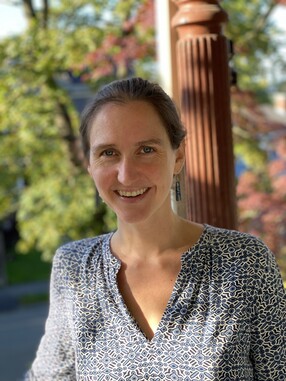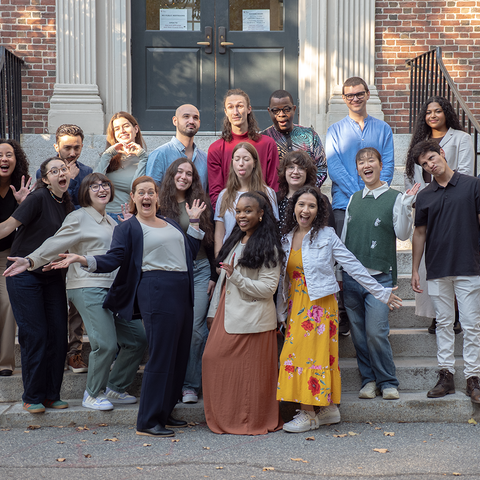The Ally
New director of student services offers support to those grappling with the challenges of graduate school life

Katie Mulroy became the new director of student services for the Harvard Kenneth C. Griffin Graduate School of Arts and Sciences (GSAS) in June. In her previous position as director of student affairs at the Fletcher School of Tufts University, Mulroy served as a central resource and support for around 600 graduate students and was deeply involved in Fletcher’s efforts to promote mental health, diversity, inclusion, and belonging. For her work, Mulroy was named the Fletcher School's administrator of the year in 2021 and received the Tufts Distinction Award in 2018. An alumna of Harvard’s Graduate School of Education, Mulroy spoke recently with Harvard Griffin GSAS Communications about her new role, the work of the Office of Student Services, and her desire to be an ally to students from diverse identities and backgrounds.
You were the director of student affairs at the Fletcher School of Tufts University. Why did you want to come to Harvard Griffin GSAS?
I loved working at Fletcher. The students were incredible. I wasn't really looking for new opportunities, but when the position opened at Harvard, it seemed really intriguing. It was a chance to work with a highly motivated student population—and one that's very international as well. I’ve lived and worked outside of the US, so working with students from other countries is a priority for me. The job is also an opportunity to help students navigate challenging personal situations so they can go into the world better for having been at Harvard Griffin GSAS. Finally, I was impressed by the staff here at the School. Everyone is very team-oriented, and I love working in collaborative environments.
How do you and the staff of the Office of Student Services work to improve student life?
As director, I lead a student services team that includes Assistant Director Keenan Bailey, who does much of the individual case management for our office, and Program Coordinator Dream Mooney, who provides frontline support to students undergoing academic and personal challenges. We’re here for students who need connections to resources—and to give them a sense of which ones might be available to them. For instance, we work with students if they’re hospitalized, if they need to take a medical leave, or have other health concerns that significantly impact their lives and academic progress. And as one of the School’s Title IX liaisons, I am here for students experiencing sexual harassment and sexual misconduct—whether they need support and resources or want information about the complaint process.
We also oversee the GSAS Welcomes program, which provides orientation for incoming graduate students. I’ll be working in the months ahead with Seth Avakian, the program director for nondiscrimination and professional conduct, on Title IX training for students. And I look forward to partnering with Keenan during the upcoming academic year to get the word out about our programs and services.
Student mental health was a priority for you at Tufts, where you developed a support protocol in collaboration with the university’s Counseling and Mental Health Services. Have you reviewed the report of Harvard’s Task Force on Managing Student Mental Health? What kind of challenges do you think our students face? How can you help address them?
I did read through the report. I think our students are under immense pressure academically, financially, and personally. So, it’s no surprise that many grapple with depression, anxiety, and impostor syndrome. That’s true of graduate programs in general, but especially at Harvard, where so many people are the best in their field. The mental health task force also reported that students struggled to make meaningful connections with peers and mentors, grappled with feeling like they don't measure up, and worried about job prospects after graduation. This is very similar to what I saw at Tufts and, before that, at MIT when I worked in a lab.
I think our office can help on two fronts. On the proactive side, I think we can ensure students have the opportunity through Harvard Griffin GSAS Welcomes to make connections with people beginning with their first days on campus. This includes connecting with folks outside of their field of study, based on their common interests—whether that’s through affinity groups, student clubs, or even parenting. It’s crucial for students to find others who are navigating the same kinds of experiences and life events.
I also think introducing students to mental health resources is incredibly important. They won’t remember everything that’s given to them on their first day, but they might remember that someone from our office talked about a particular topic and that they can come and talk to us about it later.
Finally, we need to proactively partner with graduate program administrators to help students. Everyone is here for a reason. We all have our students’ best interests at heart. So we need to work together to make sure that students don’t feel like they’re on this island trying to navigate their grad school experience alone.
On the responsive side, so many students end up facing unexpected challenges when they’re in school. Or maybe the challenges are expected and the student needs support. That’s where our office comes in. If a student is grappling with depression or anxiety and they’re not sure what their next steps are, we’re here to say, “Okay, here are resources like Counseling and Mental Health Services at University Health Services.” And if a student needs medical leave to focus on their physical or mental health, we can let them know how to take time away from their studies and how to return to them too.
Finally, you also served on Fletcher’s Diversity, Equity, and Inclusion Committee and Tuft’s Bias Response Team. Harvard Griffin GSAS’s Office of Equity, Diversity, Inclusion, and Belonging (EDIB) is dedicated to working with student groups and advocates to create a campus environment where BIPOC and LGBTQIA+ students can feel welcome. How do you understand the challenges those students face and how can you work with EDIB to promote inclusion and belonging at Harvard Griffin GSAS?
Harvard is arguably the best university in the world in so many ways. But as with all institutions of higher education in the US—particularly those considered “elite”—many students from marginalized backgrounds were not always welcome. And so, we have that legacy. And its impact is real and current.
Our office needs to be responsive and ensure that we’re helping students who need access to University resources so that they can thrive here. But we also need to be proactive in partnering with Harvard Griffin’s Office of EDIB and groups throughout the School and University. For example, we need to ensure that all aspects of Harvard Griffin GSAS Welcomes send the message that every student belongs here.
My hope is that, in partnership with the Office of EDIB and with the degree programs, we can work to create that sense of belonging and assure students that they have allies in the Office of Student Services. If things go wrong, if they feel excluded, if they’re facing microaggressions, they can talk to me. I’ll do my best to help them.
Get the Latest Updates
Join Our Newsletter
Subscribe to Colloquy Podcast
Simplecast





